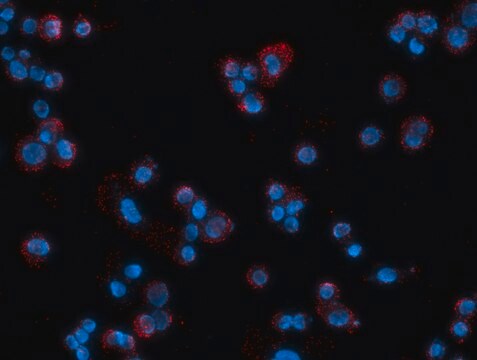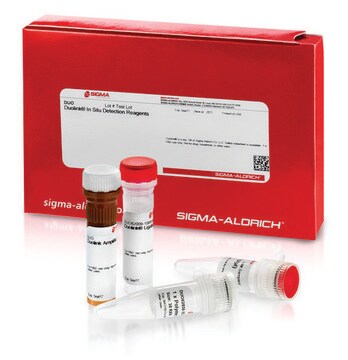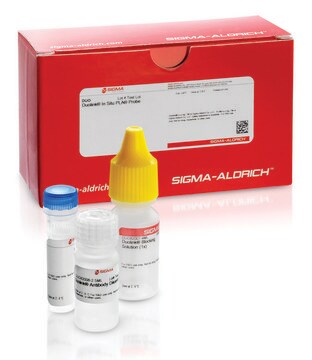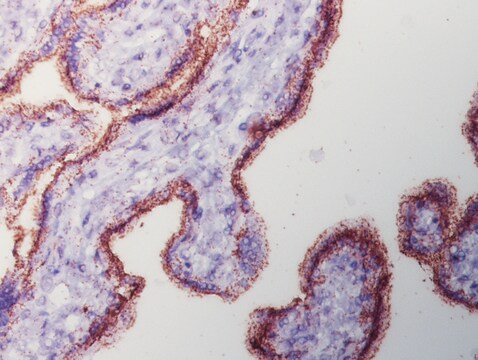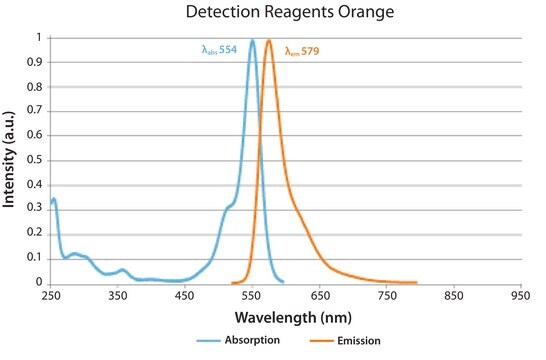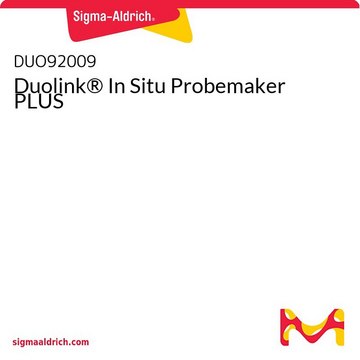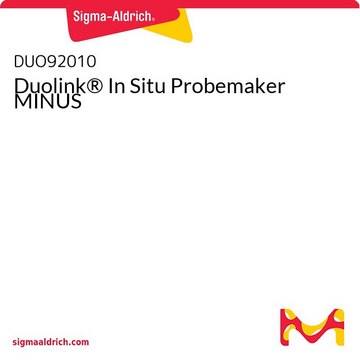추천 제품
제품 라인
Duolink®
Quality Level
기술
proximity ligation assay: suitable
형광
λex 495 nm; λem 527 nm (green) (FITC (Cyanine 2), Zeiss Filter set 38)
적합성
suitable for fluorescence
배송 상태
dry ice
저장 온도
−20°C
일반 설명
Duolink® In Situ Detection Reagents Green contains all the necessary Duolink In situ reagents to perform the amplification and detection of bound PLA® probes. The detection probes contain a fluorophore (lex = 495 nm and lem = 527 nm), which may be visualized using the same filter as Cy®2 or FITC. Experiments conducted using Duolink In situ reagents can detect and visualize protein interactions, protein expression levels and post translational modifications at the single molecule level in fixed cells and tissue samples.
특이성
Green fluorescence detection reagents are often used with FITC filter.
애플리케이션
Duolink®proximity ligation assay(PLA®) allows for endogenous detection of protein interactions, post translational modifications, and protein expression levels at the single molecule level in fixed cells and tissue samples.
Duolink® In Situ Detection Reagents has been used in the proximity ligation assay of:
- vasopressin and gonadotropin-releasing hormone (GnRH) from frozen rat brain sections
- human embryonic kidney 293 cells (HEK)
- pituitary tissues
특징 및 장점
- No overexpression or genetic manipulation reNo overexpression or genetic manipulation required
- High specificity (fewer false positives)
- Single molecule sensitivity due to rolling circle amplification
- Relative quantification possible
- No special equipment needed
- Quicker and simpler than FRET
- Increased accuracy compared to co-IP
- Publication-ready results
성분
- 5x Ligation - Contains oligonucleotides that hybridize to the PLA probes and all components needed for ligation except the Ligase
- 1x Ligase (1 unit/μL)
- 1x Polymerase (10 units/μL)
- 5x Amplification Green - Contains all components needed for Rolling Circle Amplification (RCA) except the Polymerase. It also contains oligonucleotide probes labeled with a fluorophore that hybridize to the RCA product.
Not included in Detection kit:
Primary antibodies, PLA probes, wash buffers, mounting medium
제조 메모
To perform a complete Duolink® PLA in situ experiment you will need two primary antibodies (PLA, IHC, ICC or IF validated) that recognize two target epitopes. Other necessary reagents include a pair of PLA probes from different species (one PLUS and one MINUS), detection reagents, wash buffers, and mounting medium. Note that the primary antibodies must come from the same species as the Duolink® PLA probes. Analysis is carried out using standard immunofluorescence assay equipment.
저장 및 안정성
Store the components at –20 °C. The enzymes should be kept cold (–20 °C) at all times, use a freezing block when removing them from the freezer.
기타 정보
Follow the Duolink® In Situ Fluorescence Protocol to use this product. A set of short instructionsis also available.
Visit our Duolink® PLA Resource Center for information on how to run a Duolink® experiment, applications, troubleshooting, and more.
Let us do the work for you, learn more about our Custom Service Program to accelerate your Duolink® projects
View full Duolink® product list
Visit our Duolink® PLA Resource Center for information on how to run a Duolink® experiment, applications, troubleshooting, and more.
Let us do the work for you, learn more about our Custom Service Program to accelerate your Duolink® projects
View full Duolink® product list
법적 정보
Cy is a registered trademark of Cytiva
Duolink is a registered trademark of Merck KGaA, Darmstadt, Germany
PLA is a registered trademark of Merck KGaA, Darmstadt, Germany
신호어
Danger
유해 및 위험 성명서
예방조치 성명서
Hazard Classifications
Resp. Sens. 1
Storage Class Code
10 - Combustible liquids
이미 열람한 고객
Protein Phosphatase 1c Associated with the Cardiac Sodium Calcium Exchanger1 Regulates its Activity by Dephosphorylating Serine 68 Phosphorylated Phospholemman.
Hafver T L, et al.
The Journal of Biological Chemistry, M115-M115 (2015)
Pharmacologic inhibition of Hsp90 to prevent GLT-1 degradation as an effective therapy for epilepsy.
Longze Sha et al.
The Journal of experimental medicine, 214(2), 547-563 (2016-12-29)
The glutamate transporter GLT-1 is critical for the maintenance of low interstitial glutamate concentrations. Loss of GLT-1 is commonly observed in neurological disorders, including temporal lobe epilepsy (TLE). Despite the hypothesis that targeting the mechanisms of GLT-1 deficiency may be
Xiaofan Li et al.
Journal of virology, 93(17) (2019-06-14)
Herpesviruses are ubiquitous, and infection by some, like Epstein-Barr virus (EBV), is nearly universal. To persist, EBV must periodically switch from a latent to a replicative/lytic phase. This productive phase is responsible for most herpesvirus-associated diseases. EBV encodes a latency-to-lytic
Xiaofan Li et al.
PLoS pathogens, 13(3), e1006249-e1006249 (2017-03-02)
Trials to reintroduce chloroquine into regions of Africa where P. falciparum has regained susceptibility to chloroquine are underway. However, there are long-standing concerns about whether chloroquine increases lytic-replication of Epstein-Barr virus (EBV), thereby contributing to the development of endemic Burkitt
Travis Rush et al.
Neurobiology of disease, 134, 104668-104668 (2019-11-08)
The microtubule-associated protein Tau is strongly implicated in Alzheimer's disease (AD) and aggregates into neurofibrillary tangles in AD. Genetic reduction of Tau is protective in several animal models of AD and cell culture models of amyloid-β (Aβ) toxicity, making it
문서
Find Duolink references based on the type of method used, post translational modification detected, and research focus.
관련 콘텐츠
Applications to detect, quantify and visualize protein-protein interactions, post-translational modifications and low expression protein detection using proximity ligation assay
자사의 과학자팀은 생명 과학, 재료 과학, 화학 합성, 크로마토그래피, 분석 및 기타 많은 영역을 포함한 모든 과학 분야에 경험이 있습니다..
고객지원팀으로 연락바랍니다.